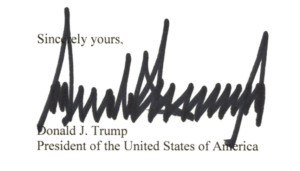This is his signature on the screwball letter he wrote to Speaker Pelosi.
Daily Archives: December 22, 2019
Linkblog
- How to recognise AI snake oil Slides of a terrific lecture by Arvind Narayanan of Princeton.
- Killer doubts Good review by Diane Coyle of * Merchants of Doubt: How a Handful of Scientists Obscured the Truth on Issues from Tobacco Smoke to Global Warming by Erik Conway and Naoini Oreskes.
- Very thoughtful commentary by Wendy Grossman on my observer column about how we hold AI systems to higher standards than humans doing the same thing.
- Elon Musk’s weird ‘cybertruck’ Jean-Louis Gasseé on whether it’s a real prospect, or just PR clickbait.
Thanks to Philip Cunningham for spotting a duff link.
The 26 words that created the Internet we have today
This morning’s Observer column:
Stratton Oakmont sued Prodigy and the unidentified poster for defamation – and won. Prodigy argued that it couldn’t be held responsible for what anonymous users posted on its platform. The judge disagreed, arguing that the company was liable as the publisher of the content created by its users because it exercised editorial control over the messages on its bulletin boards in several ways and was thereby potentially liable for any and all defamatory material posted on its websites.
The case alarmed an Oregon congressman (now a US senator), Ronald Wyden, who accurately perceived it as a mortal threat to the growth of the internet. It would mean that every online hosting service would need to have lawyers crawling over its site, thereby slowing exploitation of the technology to a crawl. So with another congressman, Chris Cox, he inserted a short clause – Section 230 – into the Communications Decency Act, which was then incorporated in the sprawling 1996 Telecommunications Act. The section itself is short (about a thousand words) but the core of it is a single sentence: “No provider or user of an interactive computer service shall be treated as the publisher or speaker of any information provided by another information content provider.”
That sentence laid the basis for everything that has followed. It constitutes, as the title of a recent book puts it, The Twenty-Six Words that Created the Internet. What it does is create a “liability shield” for online platforms…

